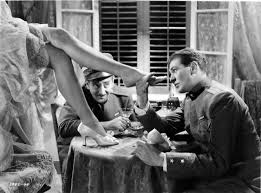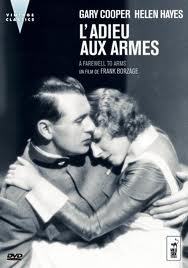My movie pick for today is part of the World War I in Classic Film Blogathon. Please visit Movies Silently and silent ology to read all of the fantastic bloggers and their posts about films that have WWI as a major backdrop.
A Farewell to Arms is a very famous novel written by Ernest Hemingway. Chances are you read it in high school or college, or just read it on your own since Hemingway was and still is considered to be one of modern America’s best writers. I have read For Whom the Bell Tolls but Farewell hasn’t made it to my reading roster yet; I need to remedy that!
The plot of this 1932 film is pretty straightforward. Boy meets girl, boy and girl fall in love, boy loses girl, boy finds girl, and I won’t add anymore but suffice it to say that it’s a Hemingway novel and there won’t be a rainbows and pots of gold type of ending.
When I watched A Farewell to Arms a couple weeks ago I was impressed by the acting, the direction,and the cinematography. The cast of this movie, at the top of their game, : Gary Cooper and Helen Hayes as the ambulance driver and nurse who fall deeply in love, Adolphe Menjou as an Italian doctor, a rival for the love of the nurse, Jack LaRue as a gentle priest, Mary Philips as another nurse who distrusts all men.
I like Gary Cooper’s roles in films but I usually would just associate him with playing the “Aw, schucks, Ma’am” kind of guy, who is a good man with a calm, laid-back manner in dealing with others. He played such men in Sergeant York(another WWI movie!), Mr. Deeds Goes to Town, Ball of Fire, and Meet John Doe. In A Farewell to Arms, his characterization was a revelation to me about his acting abilities. His Lt. Frederic Henry is an American who is tired of his life in the states, he wants some adventure before settling down, so as WWI begins, he decides to serve as an ambulance driver for the Italian Army. Frederic does his job well, works hard, and wants to play hard. He finds a compatriot in searching out bars and women with a doctor, Major Rinaldi(Adolphe Menjou). There is a fine scene illustrating this when the two men are seated at a table in a bar, examining a young lady’s leg with no objections from her.
Cooper’s Frederic changes emotionally when he meets Catherine Barkley(Helen Hayes). He falls in love, and when they are separated he is desperate to find her, to be with her for the rest of his life. He even deserts the army to find her, despite the consequence that could cost him if he’s found. At the film’s end, when at last he’s reunited with Catherine, the tears flow and it is a bittersweet reunion that alternates between hope for the world and the new life Frederic must now live.
Helen Haye’s, a petite woman when contrasted with Cooper’s height, seems very fragile. Perhaps that is one of the reasons she was cast in the film. She gives Catherine a heart of compassion which we see when she comforts another nurse who has been dismissed by the stern head nurse for becoming pregnant. We see Catherine’s steely resolve to do her duty and to not get involved with another soldier after her fiance has been killed in another battle. We then see that resolve melt away to nothing when she spends an evening with Frederic and love has claimed her heart once again. We ache for her when she has left the nursing post, has moved to Switzerland to await the birth of her baby, and all of the letters she has written to Frederic have been returned, due to Major Rinaldi’s jealous meddling; she collapses under the stress and heartbreak at the town’s post office when she is handed back all of those letters.
Adolphe Menjou, is fine as the doctor turned Major. He is an affable guy, but one we can boo and hiss at when due to his jealousy over Frederic and Catherine’s relationship, he arranges for all of the letters from Catherine to Frederic to be sent back and not forwarded. Later, with remorse, his Major Rinaldi tries to convince the awol Frederic to come back into the army, and when the Major realizes that Frederic is desperate to find Catherine, Rinaldi reveals that she is in Switzerland.
Jack La Rue, who I had only previously seen play a mafia-type leader in the British film No Orchids for Miss Blandish, was a surprise to me, too. He is a priest who recognizes the love that Frederic and Catherine have for one another. Instead of trying to counsel them to just be friends and wait until the war is over to pursue a deeper commitment to one another, he movingly and sweetly performs a wedding for them in Frederic’s hospital room. It’s a tender and moving scene, with the Priest intoning the Latin words of the Wedding Mass.
Mary Philips plays Helen Ferguson in only a few scenes, but a key one is when Frederic confronts her as to why Catherine quit the nursing post and where is she? Helen is strong in her resolve, keeps her dislike for Frederic alive, by refusing to tell him where Catherine is but gleefully adding to his worries by admitting that Catherine left due to her pregnancy with his child.
Director Frank Borzage, who I assumed was from another country-wrong! He was a former silent movie actor turned director, born in the USA! His directing skill is evident in the way he got his actors to give such outstanding performances and his scenes of the war were appropriately chilling and unusual. I found some scenes unusual in that the way they were framed and shot, at odd angles; one scene showing a soldier outstretching his arms as if copying the same position of Jesus’s arms outstretched on the cross. From my research, I discovered that after Borzage gave up acting to focus on directing, one of the directors he studied and did some work with was F.W. Murnau, famed German director who specialized in the Expressionist Movement in German Films, and then carried that with him to Hollywood. That influence had to have given Borzage the ideas for these scenes. Another interesting scene, Borzage aided greatly by his cinematographer, Charles Lang, is a point of view series of what Frederic is seeing as he is flat on his back, being wheeled into a hospital in Milan. Charles Lang did win the Academy Award for Best Cinematography for this film.
A Farewell to Arms is available to see via streaming on Amazon, either through their instant rent program or through your Roku Box(that’s how I was able to call it up and watch it for free!) One could buy it through Amazon or TCM’s Shop. Netflix has A Farewell to Arms, but it is the 1957 version that starred Rock Hudson and Jennifer Jones. As much as I like Hudson and Jones’s bodies of work throughout their acting careers, I find the version they starred in a bit draggy at times. The 1932 version with Cooper and Hayes flowed much faster.
For a look at love during the midst of a horrific war, have your kleenaxes handy, get yourself a dvd of A Farewell to Arms!!












You must be logged in to post a comment.